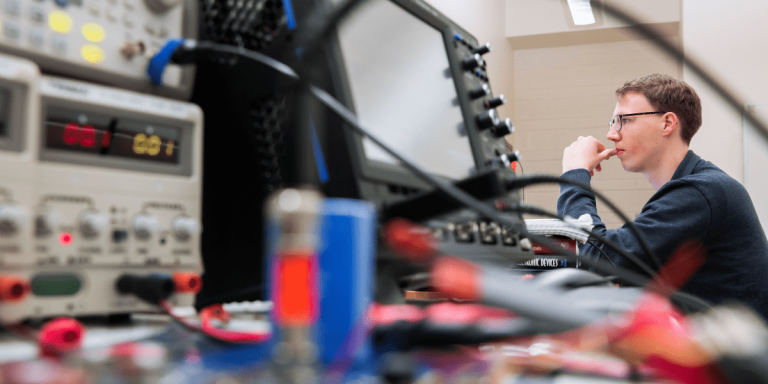
Kettering University’s research in the power electronics fields has grown so much over the last six months, that the Electrical and Computer Engineering (ECE) Department has recently opened a lab, Advanced Power Electronics Lab (APEL) devoted solely to power electronics work.
The lab, overseen by Dr. Kevin Bai, assistant professor of Electric and Computer Engineering at Kettering, features one post-doctoral fellow, one research scientist, one grad student and three undergrad students who are all working on four current contracts Kettering has with different companies. Having all of the students concentrated in one place has made it easier for Bai and his students to collaborate.
“All of the people working in the lab have a power electronics background,” Bai said. “Originally, all of my students were scattered, so it was harder to manage all of them working on specific contracts. The advantage of a power electronics lab lies on the ease of managing all the staffs as they work.”
The lab has also provided a nice showcase for the power electronics work being done at Kettering. It is another example of the research capability the university offers to the corporate world.
“The lab is a very good platform to display what Kettering has been doing with power electronics,” Bai said. “Magna E-Car and Chrysler both visited this lab and have been impressed by what we’re doing so far. What I hope in the future is that we can try to involve more research people with more research projects. This APEL lab will be really helpful to enhance our research ability and a very good start to attract more attention to Kettering. In 2010-2011, the APEL lab has already been funded around $400,000 dollars.”
Bai, who was already working with Magna to develop a power factor correction device and with Progressive Dynamics to improve the battery life of Plug-in Hybrid Electric Vehicle (PHEV) batteries, recently was awarded two more contracts working with power electronics.
One of the two new contracts is also with Magna E-Car.
“Magna has worked with Kettering on power factor correction and they are happy with the progress we have made,” Bai said. “They have found that we have the research capability at Kettering to contribute to their projects.”
The six month contract is to develop a high-powered battery charger that will allow owners of PHEVs to charge their batteries faster and more efficiently.
“In order to charge the battery faster, the chargers have to be very high powered,” Bai said. “Presently the most marketable charger is around six kilowatts, but a six kilowatt charger will still take two or three hours to finish charging. Magna wants to develop a 10 kilowatt charger, which would take about one hour to finish charging.”
The complexity of the project results from the fact that the charger must have increased power but at the same time, increase efficiency.
“The most important thing during charging is the efficiency of the charger needs to be as high as possible,” Bai said. “Using most of the present chargers as an example, the efficiency is around 91-92 percent. If we establish a 10 kilowatt charger, that means an 800 watt loss, which is too much for the charger. This charger will reach 97 or 98 percent efficiency, which means only a 200 or 300 watt loss and that will make the charger more efficient.”
Bai will work with two people on the project. Dr. Wei Guo, one of his colleagues from China, is a post-doctoral fellow, and Nicholas Cramer, a recent Kettering grad, has been hired as a research engineer.
Bai noted that presently, there are no 10 kilowatt chargers on the market that have 97 percent or higher efficiency.
“If we successfully launch this product to the market, there will be a big impact,” Bai said. “From my point of view, it will beat most of the present products on the market. That will help Kettering and Magna enhance their reputations and gain significant profits.”
Bai also noted that the relationship that Kettering has formed with Magna is very beneficial to the university because of the opportunities afforded to students.
“Working with Magna in the past five months really gave our students a lot of training that they can’t get in the classroom,” he said. “They get to learn a lot of issues by themselves, and they get to comply with the industry standards to design the system. I expect after these two projects, the students in my lab will become very qualified engineers in the automotive industry or other industries.”
Bai is also working with Dr. Guo and Mr. Cramer on a contract with Tenneco, a global manufacturing company headquartered in Illinois that is one of the world’s leading producers of emissions control and ride control products and systems for the automotive and commercial vehicle original equipment market and the aftermarket. This project entails designing an overdrive system based on traditional 12 volt battery. The project seeks to control the supply of air by controlling the speed of the air pump through the battery. Bai notes that this is easier in a higher voltage HEV or PHEV battery, but more difficult in the traditional 12 volt batter.
“If we successfully deliver this prototype, it would decrease the emissions in conventional vehicles and it could give automotive companies the opportunity to use a multi-source power supply inside the vehicle,” Bai said.
Contact: Patrick Hayes
phayes@kettering.edu
(810) 762-9538